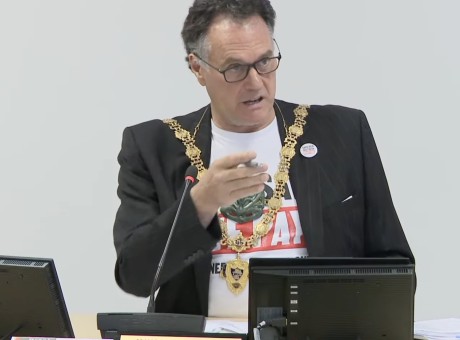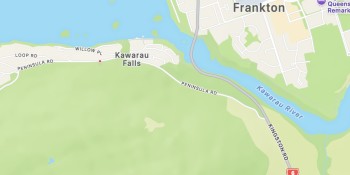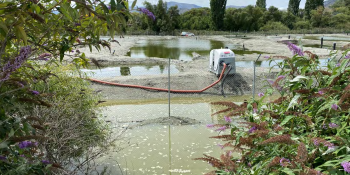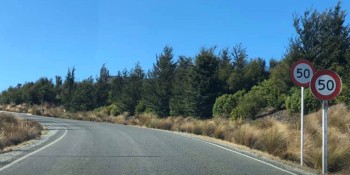Controversial 'districtisation' proposal gets CODC go-ahead
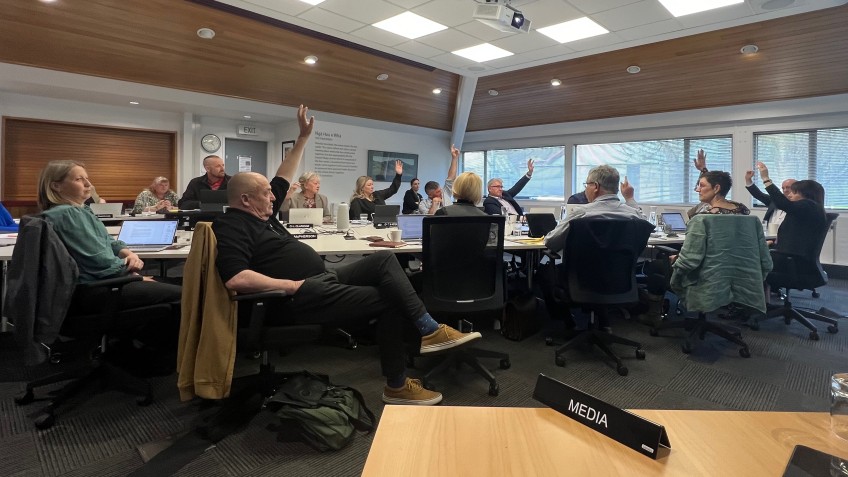
Bills for council activities will be split across the district as a whole and will not be the responsibility of any one ward to pay - that's the decision reached by the Central Otago District Council despite overwhelming community sentiment expressed during public consultation on the topic to stick with the status quo.
However the decision around the council table was not a unanimous one, with only nine out of twelve elected members supporting the move towards what's been dubbed 'districtisation'.
Until now, property, parks, cemeteries, pools and museums have been paid for by ratepayers within the ward benefiting from such a facility, but that's set to change after what was a drawn-out discussion in Alexandra's council chambers.
In it, Mayor Tim Cadogan was adamant public discourse on the proposal had been "derailed" by a "red herring".
He said the choice by "some people in Cromwell" to frame the council's proposal as a "land grab, or something like that," was a "fallacy".
Cromwell councillor Cheryl Laws, who did not support the motion, grilled both the mayor and council chief executive Peter Kelly on endowment land and comments she said both men had made in the lead up to the decision suggesting a future council could "go to the minister" to enable proceeds from any sale of Cromwell's land bank to be spent elsewhere in this district.
In response, the mayor clarified any appeal to Wellington for a change to the current arrangement would not be an easy process and would require specific community consultation.
He explained that when he had seen it happen before it had been initiated by the community of interest itself - not by an outside community looking to gain from any change.
"It is a complex thing, and apologies if my flippancy gave the wrong impression," he said.
"If the idea was to pinch the endowment land that's the path we would have taken...If that was the intent, if that was the ambition, if that what we're thinking about, the conversation right now would be about whether we're going to the minister to change the endowment, and it isn't."
Staff also confirmed any revenue from endowment land sales would be "ring fenced", protected for use only in the appropriate community intended to benefit from it, but did not rule out that money being loaned within the council for other purposes.
Assurances were made again and again by the mayor that the decision on the table was not about land - or control of it.
But it was not enough for Councillor Laws.
"Even though I've heard assurances that the endowment would be respected, that is this council only, not future councils. And I have no doubt future councils, put under pressure, could possibly change," she said.
"On one hand, I understand districtisation makes sense; on the other hand, I'm looking at the uncertainty."
Another Cromwell councillor, Sarah Browne, also voted against the motion, but indicated the decision was a difficult one and aspects of it still left her confused.
She said there had been a lot of "noise" in Cromwell on the proposal, however she "worried that there's still too much stuff that's not certain or locked down or any better for doing it".
The council effectively opted for 'option two' consulted on with the community, which will save Crowmellians an average $35 a year a year in rates bills over the next decade.
It was not the option supported by an overwhelming majority of those who took part in council consultation on the proposal - two-thirds of whom supported the 'option three' presented, sticking with the status quo.
But as Councillor Martin McPherson of the Vincent ward reminded those around the council table, this was "a consultation not a binding referendum".
It was noted the consultation results were "swayed" by a heavy Cromwell contingent - or as deputy mayor Neil Gillespie put it, "a whole lot of 60 year olds in Cromwell".
Cromwell Community Board chair Anna Harrison was invited to speak on behalf of the board at the start of the discussion on the proposal.
Ms Harrison acknowledged the debate on 'distictisation' - although she hated using the 'made-up' term - had started with an earlier move to rein in the decision making power of the district's community boards, which the Cromwell board had strongly rejected.
She said the conversation had evolved over the months, moving away from a "no, no this is a terrible idea" position, to one of wanting to ensure, whatever model was adopted going forwards, the voice of community boards would continue to be a strong one in council proceedings.
Just how that will be achieved is unknown, but the mayor and plenty of councillors around the table committed to doing so.
It was flagged a decision on community board delegations will be brought back to the council in November.
Ms Harrison said in Cromwell there is "still a lot of very strong feelings and probably a lot of distrust" about what all the changes might mean.
"There are lots of opportunities here for us to get this really right; but there is also a lot of risk, and mitigating that risk and moving forward in a way that assures our communities that we're not doing stuff to them (is important)."
Deputy chair of the Vincent Community Board Jayden Cromb made a strong case for shaking things up, endorsing the council's pitch that Central Otago should consider itself 'One District' first and foremost, particularly in light of ever increasing rates and a looming debt ceiling.
"We've come to the conclusion change is necessary," he said of his board's view on the proposal, rejecting any "us versus them" mentality.
"Our governance structure may look different tomorrow but people around this table care just as much as community board members do and are just as local as us. It's time we start paddling this waka in the same direction."
This was a sentiment shared by many of the councillors that voted to carry the divisive motion.
Councillor Tamah Alley, of the Vincent ward, said, "Our borders are not hard borders, there's no wall, there's no passport required, and we share around our district, in many ways, not just financial ones".
Tracy Paterson, also of the Vincent Ward, said, "We all have our own patches, but when we sit at this table, we're here for a district view."
Meanwhile Councillor Sally Feinerman, of the Teviot Valley ward, urged those around the table not to let fear about what's coming around the corner cloud their decision.
She said in the three waters space the country was now "in a muddle" because discourse had veered towards claims of asset grabs too.
"We are one district and we need to come together to achieve the best outcome that we can for our whole district."
A new community owned swimming pool in the Teviot Valley was acknowledged in the council decision, which subtracts district-wide swimming pool costs from rates bills there.
In her report to the council on the decision, business support manager Saskia Righarts said the rationale behind a district-wide rating model "was to move more of the strategic spending decisions to the council level".
"Current predictions will see council reach its funding cap (debt to revenue ratio of 175 percent) in the 2025/26 financial year. Officers are currently investigating options to achieve a credit rating which will enable to the revenue to debt ratio to increase to 280 percent."
Councillor Ian Cooney, of the Vincent ward, voted against the motion, along with Councillors Laws and Browne.
The full council meeting kicked off at 6pm on Tuesday night, with the handful of members of the public who had asked to speak to their submissions on the proposal being heard.
Among them, Cromwell Ward resident James Dicey, who urged the council to keep things the way they were - and didn't mince words while doing so.
"We should leave things as they are. It's worked for 30-plus years. It respects the history, where we've come from."
He said with no reveal yet of the delayed Long Term Plan, it was his view people in Cromwell were "very suspicious of the motives" of the council on this one.
"It's a power, a money and a control play."
However Vincent Ward resident Kristy Rusher had no time for the argument that council land in Cromwell belonged to residents of that ward, referring to it as "that old chestnut".
"Those assets have always been district assets," she said, "It's a false argument to say they've always been a Cromwell asset."
She referred to council revenue as being a pie - a pie she wanted to be made bigger.
Several references were made at the meeting to problems with council process on the proposal.
Councillor Laws said she heard from many would-be submitters who had given up "frustrated" with the registration process for the 'Let's Talk' consultation, so never had their say.
Some council staff said they had been made aware of such issues and had supported anyone referred to them through the process.
Meanwhile Councillor Nigel McKinlay, of the Cromwell ward, said, while he supported districtisation "in theory", he felt torn making a decision as he thought the council hadn't "entirely handled things as well as we could have".
Referring back to the original delegations debate, he said things had been "done in haste, with a lack of basic information", and he held similar reservations about the level of information in the report on the latest decision.
Main image: Nine councillors vote 'yes' to district-wide rating of almost all council activities at the Central Otago District Council meeting in Alexandra on Wednesday, September 25, 2024.






